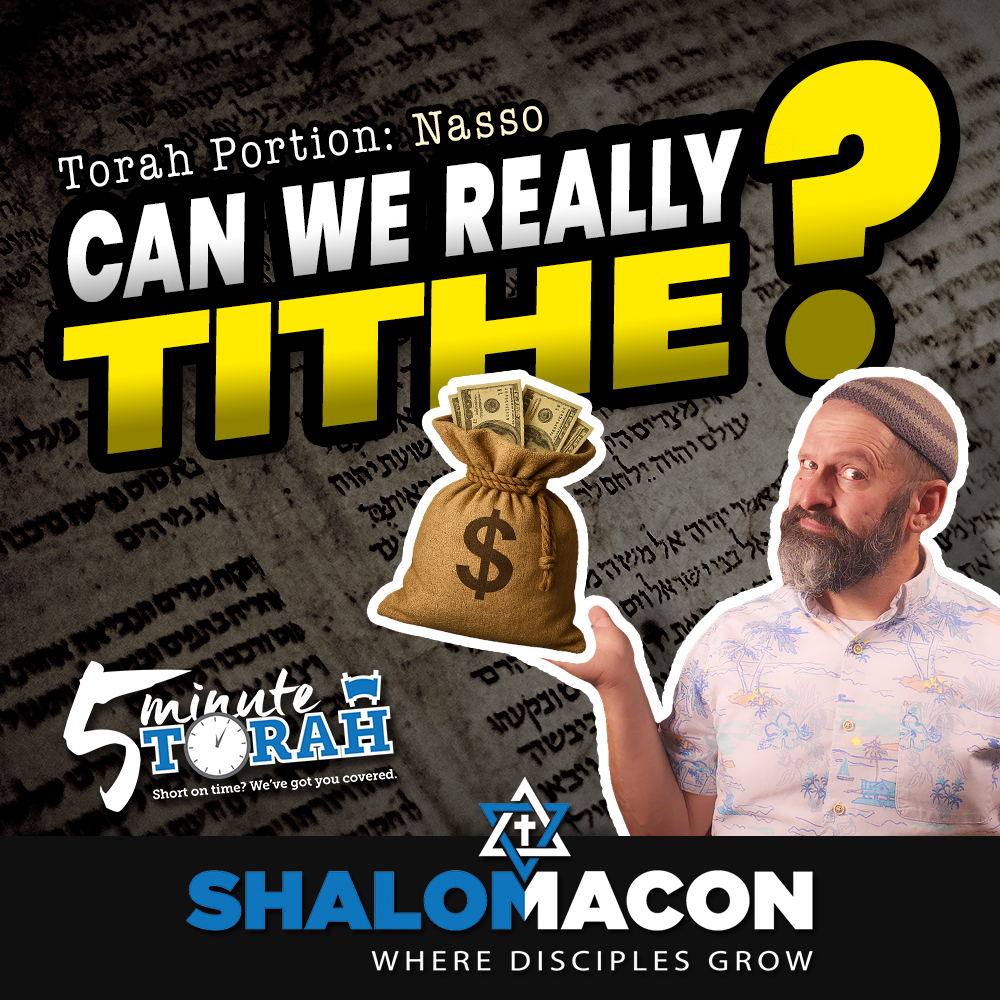Episode Transcript
[00:00:00] Everything we have comes from God.
[00:00:03] He gives the seed that we plant to grow the crops that produce the foods that sustain us.
[00:00:09] Because of this, the Lord asked that we give a portion of it back to Him.
[00:00:14] Before the destruction of Jerusalem at the hands of the Romans, the Israelites brought the tithe of their produce to the temple as a means of taking care of the priests and Levites.
[00:00:26] But are we supposed to do that today? And honestly, do we even have the ability is giving to a church, a synagogue or a ministry today truly consider tithing?
[00:00:36] Let's find out together in this week's five Minute Torah Shalom and Blessings from Shalom Macon, the place where disciples of Yeshua learn, connect and grow. I'm Darren and before I get into the five minutes of my five Minute Torah commentary, let's cover a few quick facts about this week's Torah portion.
[00:00:58] This week we are studying the 35th portion, the portion of Nassau numbers 421 through 789. And here are the three things that you need to know about it.
[00:01:07] Number one test of the Sotah Creating Shalom Bayt the Torah portion of Nassau describes the test of the Sotah, a ritual for determining the guilt or innocence of a woman suspected of adultery that could only be performed when the temple or the tabernacle was in service. If a husband suspects his wife of infidelity and there were no witnesses, he would bring her to the priest along with a grain of offering. The priest would then prepare a mixture of holy water and dust from the tabernacle floor and write a curse on a scroll, which is then washed off into the water. The woman then drank the bitter water after swearing an oath of innocence. If she's guilty, the water would cause a physical reaction leading her to punishment. If she's innocent, she would remain unharmed, trust would be restored, and the couple would be able to conceive children.
[00:01:54] Number two the Nazirite Vow Extreme Commitment the Nazarite vow was a special commitment taken by individuals who dedicated themselves to God for a specific period of time. Those who took the Nazirite vow would have to abstain from wine, grapes and any grape products, avoiding cutting their hair and staying away from corpses to maintain ritual purity. These restrictions coincide with the individual's heightened state of holiness and separation for divine service. At the end of the vow period, the Nazirite underwent a purification ritual that included offering sacrifices, shaving their head, and burning the hair on the altar. Since Nazirite vows are tied to the temple, they're not encouraged today as there is no way to end the vow once it is complete.
[00:02:41] 3. Restitution making right the Wrong in this week's Torah portion, the laws concerning restitution for wrongdoing emphasize justice and accountability within the community. When an individual commits an offense against another, they must confess their sin and make full restitution to the wrong party. This involves repaying the principal amount of what was taken or damaged plus an additional fifth of its value as a penalty. If the wrong party has no close relative to receive the restitution, it is given to the priest along with a ram for atonement. These laws show the importance of taking responsibility for one's actions, making amends and restoring relationships within the community. Are you a disciple of Yeshua? There are a lot of people who say they are, but when it comes down to it, they really don't even know what it means to be a disciple. Why? Because discipleship is a concept unique to Judaism. It's an intimate relationship between a rabbi and his student. Yeshua called 12 men to be in his inner circle of discipleship, and those 12 men changed the world. What did they know about being a disciple that we don't? I wrestled with this question when I wrote my book the Four Responsibilities of a Disciple. There were a ton of books already written on how to make make disciples, but I wanted to know what it meant to be a disciple because it seems that all of these disciples that were being made in our day really weren't having an impact on the world around them like they should. I found out that there were four responsibilities every disciple should know and that when implemented, living out these four responsibilities has the potential to change the world. If you want to know what it means to be a true disciple of our Master Yeshua, then check out my book the Four Responsibilities of a Disciple, using the link below. This week's Torah commentary is called Is Tithing Still Applicable Today? And comes from my book 5 Minute Torah, Volume 3.
[00:04:30] Tithing is a favorite subject for many people and a popular topic that makes its way into the pulpits of many churches. Often Malachi 310 is used to challenge parishioners to financially support the local church. Bring the full tithe into the storehouse the that there may be food in my house and thereby put me to the test, says the Lord of Hosts, if I will not open the windows of heaven for you and pour down for you a blessing until there is no more need. Unfortunately, this passage is Number one, often used as a form of abuse and control, and number two not truly applicable outside of Israel. When the Holy Temple is no longer standing. How does this connect with this week's Torah portion?
[00:05:12] We will get to that shortly, but let's begin by discussing the biblical definition of the tithe. First, the Hebrew word for tithe is maser, which literally means tenth part. So we can see that the root concept is based on a tenth of something. Second, tithes are almost exclusively agricultural. They are the produce of the trees, the field, the vineyard, the cattle, and the flock. See Leviticus 27. Third, tithes are connected to the physical land of Israel. Deuteronomy 12, 5, 7 specifies that tithes were to be instituted once the Israelites entered the promised land. It was a token by which they returned the blessing that God had bestowed upon them in the land flowing with milk and honey. Last, tithes don't belong to a church, a synagogue, or a parachurch organization. They were created to support the kohanim, or priests, and and the Leviim, the Levites, the sojourners, the orphans, and the widows. See numbers, chapter 18 and Deuteronomy 26. And some tithes were set aside for one's own personal household to purchase food and drink for the festivities of holy days. See Deuteronomy 14. Based on this information, tithes in a literal biblical sense have no current application. However, this week's Torah portion contains a brief passage that can provide insight and wisdom to help us understand the principle of tithes, tithing, and whether it can still be observed in any way today. Numbers 5, 9, 10 says, and every contribution, all the holy donations of the people of Israel, which they bring to the priest, shall be his. Each one shall keep his holy donations. Whatever anyone gives to the priest shall be his. The problem with understanding this verse is because of the pronouns. In the last portion of verse 10, it is unclear what who owns the contributions. The literal reading of the beginning of the passage says, a man's holies shall be his. And the end of the passage says, whatever anyone gives to the priest shall be his. Does the word his refer to the priest or the one who has given the contribution? The traditional understanding resolves the problem, like the JPS translation which says, each priest shall keep what is given to him. But Rashi brings down a midrashic interpretation from Sifre that gives us a spiritual principle we can learn from the text. He says the beginning phrase, a man's holies shall be his, could mean that the tithes one is obligated to give over are a reflection of how his field produces. In other words, if he refuses to give over, his obligated tenth, then the entire crop will only produce a tenth of what it would have produced if he had obeyed the commandment of tithing. His holies shall be his means that he only retains the portion designated for the tithe. The other 90% is forfeit. We must remember that it all belongs to the Lord anyway. We can keep 10% or 90% based on our choices. What does this have to do with us today when most of us do not live in the land of Israel and there's no holy temple, no Kohanim, no Levi' Im serving at their posts? It means that we can take this principle of the Maaseh there and find symbolic and practical applications in our own lives. First, by setting aside a tenth of what we earn or have been given, we are recognizing that everything we have comes from our Creator. Second, it means giving back a small portion of what we've been entrusted with in a way that blesses others. As Proverbs 19:17 says, Whoever is generous to the poor lends to the Lord and He will repay him for for his deed. No, it actually isn't tithing when we give money to a ministry, but it is giving Tzedakah, which literally means righteousness and we translate it as charity. And tzedakah is not limited to ministries. Even more importantly, we are to give to the poor, to the homeless, to the orphans, and to the widows based on this tithe principle. Once we begin putting this principle into practice, we might find that we are richly rewarded by for our stewardship. Are you struggling with giving away a portion of the resources that you've been entrusted with? Just begin giving back a portion of what you've been given and see what the Lord can do.
[00:09:32] Once again, if you haven't checked out my video series called Perkei Avot and the Teachings of Yeshua, then you are missing out. You're guaranteed to learn something and it will revolutionize the way you understand the teachings of Yeshua. Just click on the link right here to get started.



